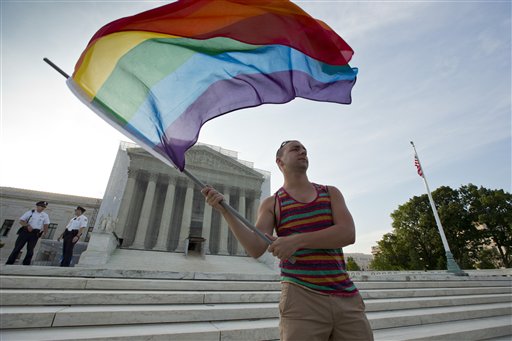As the Supreme Court prepares to hand down its decisions in two key cases about gay marriage today, the shadow of Roe v. Wade, delivered forty years ago, hangs over the Justices. The landmark abortion decision was a federal and judicial intrusion into what had been a process of state-by-state debate in which many states had begun lifting blanket restrictions on the procedure. Roe v. Wade invalidated remaining state bans–but instantly polarized the issue, creating nationwide political divisions that fester to this day.
In considering the two gay marriage cases–one concerning California’s Proposition 8 (2008) excluding gay marriage, the other considering the federal Defense of Marriage Act (1996) and its ban on federal benefits to gay couples–the Supreme Court has certainly also considered the lessons of its intervention in Roe v. Wade. At the moment, many states have rejected gay marriage, but several states have recently approved gay civil unions or outright gay marriage, both through the state legislatures and directly through the ballot box.
The Court may be reluctant to pronounce on an ongoing debate, at the risk of polarizing the nation once more, as social mores and ideas about gay sex and gay relationships are in the midst of a delicate transition.
Though the two cases are different, there are, broadly speaking, two issues that unite them. One is the issue of whether discrimination between gay couples and straight couples is so unjust that it must be taken out of the hands of elected representatives and voters. The other is the issue of whether the nation can impose a uniform rule about gay marriage, one way or the other–which the Defense of Marriage Act did in a roundabout way–given both the Tenth Amendment and the Constitution’s “Full Faith and Credit” clause.
President Barack Obama’s own stated position (for the past year, anyway) has been that gay marriage should be legal but that states should be given the choice. In practice, his administration has, strikingly, refused to carry out its duty to defend the Defense of Marriage Act. His campaign has lent support to statewide efforts to approve gay marriage at the ballot box–partly, though not exclusively, because the same voters who came to the polls to vote for gay marriage were likely to vote for Obama and the rest of the Democratic ticket.
That has not satisfied the most vociferous activists in the gay community–including a heckler who accosted First Lady Michelle Obama earlier this month–but it seems to capture the national mood (unsurprisingly, since Obama’s position and “conversion” were likely dictated by political opportunism and circumstances rather than sincere reconsideration of his supposed earlier support for traditional marriage). Invalidating both Proposition 8 and the Defense of Marriage Act would preempt–and perhaps inflame–national debate.
Politically speaking, almost all of the controversies involving gay rights and gay marriage have involved debates within the Democratic Party and the left. The military’s “don’t ask, don’t tell” policy, now repealed, was promulgated by President Bill Clinton. Likewise, the Defense of Marriage Act was a Clinton initiative. Proposition 8 passed because key sections of the Democratic Party base–African-Americans and Latinos–voted for it. Republicans have become more tolerant of gay lifestyles but remain largely unmoved on marriage; Democrats have seen the most sweeping, generational changes, driven partly by popular culture and also by President Obama’s own shift, which may have shifted opinion in the black community. Yet a sudden imposition of the Court’s will on those debates could make the issue more uncomfortable for Democrats and could make the issue a flashpoint in the coming 2014 elections and in 2016 as well.
Given the cautious approach taken by the Court in other cases this term–remanding a contentious decision on affirmative action back to the lower courts, striking down one provision of the Voting Rights Act but not the whole–it is likely that the Court will find some way to avoid the Roe v. Wade effect, and let states rule.

COMMENTS
Please let us know if you're having issues with commenting.